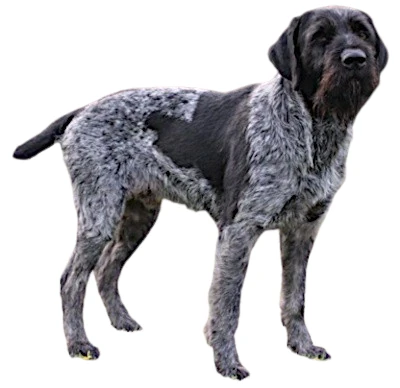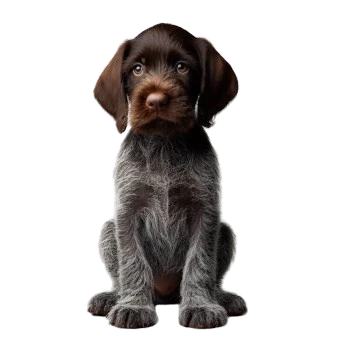
The German Wirehaired Pointer is a breed of hunting dog from Germany, renowned for its ability to hunt in various terrains. With its rugged coat and robust build, it is particularly suited to harsh weather conditions and diverse environments.
The German Wirehaired Pointer is a medium to large-sized dog with an athletic and well-proportioned build. Males typically stand between 62 and 66 cm at the shoulder, while females measure between 58 and 64 cm. Weights range from 25 to 35 kg. This breed has a solid and muscular body with a deep chest and powerful legs that allow for agile movement. Its head is broad with a strong muzzle and a moderate stop. The eyes are medium-sized, often brown or amber, and convey great intelligence. The ears are medium-sized, drooping, and covered with long hair. The tail is often docked or carried in a saber-like fashion.
The coat of the German Wirehaired Pointer is one of its most distinctive features. It is dense, wiry, and double-layered, with a thick undercoat that protects against the elements and rough terrain. The topcoat is of medium length with a harsh texture, providing excellent protection against brush and varied weather conditions. Coat colors can range from brown to steel gray, often with white markings or patches. Regular grooming is necessary to keep the coat healthy and free from tangles.
The German Wirehaired Pointer is known for its intelligent, energetic, and determined temperament. It is a highly competent hunting dog with a great focus and exceptional scenting ability for tracking game. It is also very loyal to its family and tends to be protective. This dog is often affectionate with children and sociable with other animals. However, it requires regular mental and physical stimulation to prevent boredom and destructive behavior. The German Wirehaired Pointer is responsive to training, especially when guided with positive and consistent methods.
The German Wirehaired Pointer is generally healthy, but like all breeds, it can be prone to certain health issues. Common problems include hip dysplasia, eye disorders, and skin issues. A balanced diet, regular veterinary check-ups, and adequate exercise are essential for maintaining overall health. The dense coat also requires special attention to avoid skin infections and parasites.

The German Wirehaired Pointer puppy is an energetic and sturdy hunting dog, perfect for active families. With its dense, rough coat, it is particularly resistant to harsh weather conditions, making it well-suited for outdoor life and hunting in challenging environments. Intelligent and loyal, this puppy needs physical and mental stimulation to thrive. Affectionate, it quickly bonds with its owners and shows protective instincts, but it requires early socialization to get along well with other animals.
The price of a German Wirehaired Pointer puppy generally ranges from €800 to €1,500, depending on its lineage, pedigree, and breeder. Puppies from well-known hunting lines may be more expensive due to their natural abilities and initial training.
The German Wirehaired Pointer is an intelligent, energetic, and versatile dog, but its training requires patience and a structured approach. Start by establishing clear rules and a regular routine so it understands what is expected. Use positive training methods, such as rewards and encouragement, to reinforce good behavior.
Early socialization is essential for a German Wirehaired Pointer. Expose it to different environments, people, and animals to make it a well-balanced and sociable dog. Finally, provide varied activities, such as tracking games, obedience exercises, or dog sports, to stimulate its intelligence and channel its energy.